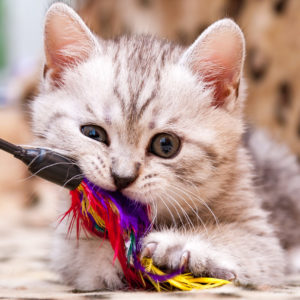The single largest health threat or disease condition in dogs and cats is identical to the largest one in humans. It is obesity. Recent estimates suggest that almost half of our pets are overweight (45%) to one degree or another. Within our practice approximately 10% of our canine patients are obese, with another 10% being seriously overweight. The remaining 25% or so are “just a bit chubby”. Cat numbers are pretty much along the same lines, although it seems that more than 10% are seriously overweight. Obesity impacts our pets’ lives at all levels. Obese animals live shorter lives and they have a higher incidence of arthritis (and the arthritis is more severe), much like humans. They can also develop many other serious disease conditions as a result of their obesity including; diabetes, heart failure, liver disease, and pancreatitis. Purina completed a study a few years ago that proved that overweight dogs live shorter lives than slim dogs and that the lives of the slimmer dogs were of a much higher quality (due to lack of disease conditions) than obese dogs. We all suspected this of course, but we now have actual scientific proof of it. So, keep your pets slim, and they will live longer, healthier lives folks!
Take a look at this site: Veterinary Partner
So why are all of these animals obese? There are many factors that contribute to obesity in our pets. The first and foremost is overfeeding. Overweight animals, by definition, are taking in more calories than they are burning. This leads to the conversion of excess calories into fat. The problem is truly that simple. People often like to make excuses to explain this away; “He’s lonely and I feel guilty.”, “He won’t eat his food unless I put a bit of something on it.”, “He just doesn’t get as much exercise as he used to.”, or (my personal favourite) “It’s all that fur Doc!”. It still boils down to the same problem, the pet is taking in more food energy than they require and they are turning it into fat. Feed less calories and your pets will lose weight.
Another major factor that contributes to obesity is the excessive feeding of high calorie “treats” or high calorie “people food”. Treat your pets’ “treats” as just that… treats. My advice to people generally is to think of a biscuit treat as a chocolate chip cookie for a kid. One or two a day will not spoil their appetites for real food, but more than that will, especially in the smaller dog breeds. It is important to realize that most of the diets available on the market today meet all of your pets nutritional requirements. They don’t “need people food” to make up for any perceived lack in their diets, so please refrain from feeding them unhealthy “snacks” or leftovers from the table or bites from your plates. If you really want (or need?!) to feed your dogs any “human food”, use fresh vegetables and fruit! They are as healthy for dogs as they are for us. They are also a wonderful source of high quality fibre, contain lots of healthy vitamins and minerals and have no significant fat or protein levels to cause problems! So do your dog a favour, cut the snacks back folks. Mind you cats will also benefit from the occasional vegetable for a snack. It truly is hysterical to watch your cat stalk, kill and “dismember” a green bean!
Cats are a bit different of course, because they are carnivores, and dieting them is a whole lot harder too. PLEASE DO NOT DIET CATS ON YOUR OWN without veterinary supervision. They are carnivores and over-aggressive dieting can cause a condition called “Fatty Liver Syndrome”. Obese cats (the ones that are being dieted of course!) are particularly at risk for developing this deadly condition. Veterinarians have medical diets available that are specifically designed to safely make cats lose weight, without running the risk of triggering Fatty Liver Syndrome. Cats who develop Fatty Liver Syndrome will almost always die from it. So please, come and talk to us about the appropriate way to diet a cat.



